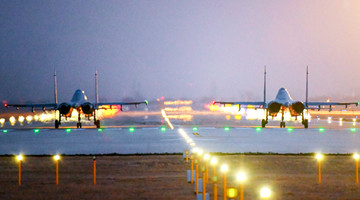By Li Ruijing
The year of 2017 has been a great turning-point in the history of the world's anti-terrorism. The so-called "capital" of the "Islamic State" was recovered and its leader and a great many number of terrorists were killed. The independent army and administrative system of "Islamic State" was disintegrated.
The defeat of the "Islamic State" is a major victory for the entire world. However, there are still many new challenges for the international community.
'Return jihad' will be a major threat
The birth and development of the "Islamic State" lasted for more than 10 years and it’s already been three years since its so-called "founding of a nation". When Baghdadi established the "Islamic State," he announced a "Five-Year Plan" to establish a cross-regional "Caliphate" that encompasses West Asia, North Africa, South Asia and Europe.
The decline of "Al-Qa'eda", the destruction of the "Islamic State" and its "territory" cannot yet be interpreted as the extinction of the two in the organizational form, nor can they be interpreted as the disappearance of extreme religious ideology.
However, in the "C-type unstable arc" from South-East Asia, South Asia, the Middle East and North Africa, the soil for the breeding of terrorism still exists. Previously, the "Islamic State" had the strength to fight directly against the government forces in that area.
With the defeat of the "Islamic State," the international community may face even tougher terrorists who have become invisible, intangible, and "lone wolfs." "Return jihad" will be a major threat to the international community.
According to incomplete statistics, tens of thousands of foreign "jihadists" rushed to the Middle East within just a few years. After the "Islamic State" collapsed in Syria, its members fled and the threat posed by their "return" could not be underestimated.
These terrorists have intensified their extreme thinking and accepted terrorist training in Iraq and Syria. They are not only a real threat but also a troublesome for their home country. At the same time, terrorist groups will use the peripheral branches to carry out joint destruction.
Since 2015, the so-called "jihadists" have successively carried out terrorist attacks in Belgium, France and other countries. During Ramadan in 2017, the number of global casualties increased by 380 percent over the same period in 2016.
New variations in terrorist attacks
In addition to the conventional "Return jihad", terrorists have never given up trying to find new tactics and create new terrorist attacks through technological means.
First, we should prevent "cyber nukes." Most terrorist groups and extremists are hostile to modern civilization. Ironically, they have spared no effort using the Internet, a result of modern civilization, to finance terrorist attacks and communication.
At present, the entire human society seems to be operated "on the software." Under such circumstances, a deadly attack on the Internet will disrupt the operation of the society. Last year, the outbreak of ransomware provided a wake-up call for the international community.
If terrorists conduct large-scale attacks on the industrial Internet, such as nuclear power plants, substations and other power systems or financial systems, the consequences would be disastrous. The Ukrainian power system was attacked twice in 2015 and 2016 causing massive power outages.
The National Infrastructure Commission of the US also warned that if the energy industry suffers from a "cyber nuke" attack, it will be the worst terrorist incident since the September 11 attacks.
Terrorist organizations also often use new media to release audios and videos in English, Arabic, French, German and other languages to recruit and encourage attacks. In response, all countries should formulate plans to crack down cyber extremism, step up the control over information related to terrorism, and disrupt and interrupt the spread of extreme information.
Second, we should prevent "super violent terror." The "super violent terror" refers to the terrorist attacks that use nuclear, chemical and biological weapons, while the number of victims exceeds 100,000.
At the beginning, the international community did not think that terrorists will use these weapons because the technical threshold was high and it was subject to the psychological and ethical bottom line. However, with the diffusion and diversification of various technologies across the world, and the global movement of skilled personnel, the technical threshold has become increasingly lower.
After the Tokyo subway sarin attack by Aum Shinrikyo extremists, the international community realized that the moral bottom line for terrorists can only get lower. Therefore the international community must not underestimate the possibility of "super violent terror" incidents and all countries must take corresponding measures.
Addressing both the symptoms and root causes of terrorism
Terrorism is the "tumor" in the human society. It has not reached its end; it cannot be completely cured in a short term.
The analysis shows that it is still necessary to tackle both the symptoms and the root causes and eliminate the breeding grounds for terrorism by breaking the vicious circle of "violence against terrorism" and "more terrorism after cracking down" in recent years.
A high-pressure strike should be established to undermine the decision-making chain, cut down the capital chain, track the communications chain and disrupt the logistics chain to current terrorist groups and terrorists. We must cut the spreading of terrorist information and paralyze terrorist organizations. We must set up an early warning system for terrorist attacks and effective counter-terrorism measures.
Terrorism is the result of the spillover of social governance. Its profound roots are complicated economic and social conflicts, and are also direct consequences of the inaction and irresponsible behavior of some countries. A large number of young people are unemployed and disappointed in "failed countries" had to seek spiritual comfort from extreme religious beliefs.
With that being said, the elimination of terrorism should start from the establishment of a new international political and economic order, the establishment of a mechanism for regional security and stability, as well as the social governance, economic development and improvement of people's livelihood in each country.
We should fundamentally eradicate the breeding ground for terrorism to reduce the number of "latecomer" terrorist organizations and "second-generation" terrorists. Only with this can humankind be able to gradually eradicate terrorism.









